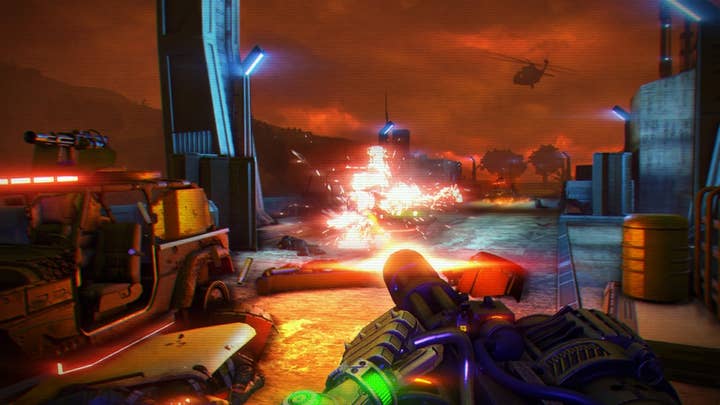Talking Shop: Far Cry 3 Blood Dragon's Production Manager
We chat with Philippe Fournier about bringing the creative and technical together
In our latest Talking Shop, GamesIndustry International sits down with another member of the industry to talk about what they do. Today, we're talking with Ubisoft production manager Philippe Fournier. Fournier recently shipped Far Cry 3: Blood Dragon and he was also the production manager for that game's parent title, Far Cry 3. Prior to that, he worked on the technical side of the industry as a software engineer for Ubisoft, Utherverse Digital, and Behaviour Interactive.
My role is to make sure we have a realistic scope and enough resources to achieve the creative direction of a project in the desired timeframe. Basically, it's about distilling the direction into quantifiable tasks, putting together the best team to achieve the mandate, and tracking the progress so we can react properly if anything happens. To be successful, the production manager needs to act as a coach, a mentor, a leader, and sometimes as a parent. It's also his role to protect his production team from any external noise, while representing that team across the entire production.
A production manager is responsible for the delivery of a certain aspect of a game such as art, cinematics, audio, or gameplay. In contrast, the producer is responsible for shipping the entire game on time and on budget. On AAA productions, producers usually don't have time to be closely involved with the actual production of the game and are often surrounded by many production managers to act as their representatives on the floor.
"To be successful, the production manager needs to act as a coach, a mentor, a leader, and sometimes as a parent"
Most of the scheduling is done in the early stages of the production when the scope is defined according to time and resources. During actual production, I spend more time supporting the production team by clearing dependencies or providing them with some much needed love.
Usually, I try to spend most of the day on the floor reviewing the game with creative people and trying to find solutions to personal or technical issues with my colleagues. When it's time to plan, I try to isolate myself from everything so I can focus and think about all of the possible issues or tasks we might have forgotten.
For me, it's more about translating what the creative side wants into technical terms and making sure that both parties understand each other before committing to production. To achieve this we define processes that ensure that creative and technical people get to sit together and officially approve features or mission requirements. Obviously, there are some instances where conflicts will arise, but if the process is efficient they should be minimal.
At my peak, it must have been around 40 people including team leads for specialized disciplines like character modeling or animation. Since I was responsible for many different disciplines, the biggest challenge was finding time to follow up on each of the different teams and making sure they understood where the project was going. The best way to be successful in this is to have a strong structure; that makes it easier for the production manager to focus on critical issues.

For me, it's all about leadership and communication. The easiest part is the planning phase, where I can rely on experienced and technical colleagues to help me schedule the tasks across production. The hardest part is making sure that we stay on track and that people know and understand where we are heading. A manager is successful when the team is happy and production flows as it should.
Both personal and organizational skills are necessary to become a production manager. Without one or the other it would be hard to react to changes that happen frequently during game development. The ideal production manager is organized, so that he can communicate the status of the production efficiently to his team and to the producer. Both sets of skills allow him to be in control of the situation, which is key to demonstrating leadership and shipping the game with confidence.
It's not uncommon for AAA projects to produce a special demo that can become a project on its own. This is usually the case for E3 or press events: we need to show a vertical slice of the game in its final state while the rest of production follows its regular course. To make this happen you need to choose your battles wisely and make sure that priorities are set accordingly. Most of the time, marketing wins.
Sometimes you might be lucky and get to talk about what you like best - your team and your game - to journalists. Most of the time though it's all about the production team or interfacing with other services like human resources or IT to get some issues solved.
"A manager is successful when the team is happy and production flows"
Actually, I started as a software engineer coding gameplay and artificial intelligence features on DS games. As a programmer, you get to interact with a lot of different disciplines from design to art and animation. This is where I realized that I enjoyed helping the team achieve its overall goals in an efficient way. Most of the skills needed to become a production manager are learned from actually creating video games and that experience was the greatest doorway reaching that objective.
Definitely leadership.
My suggestion would be to learn skills required to make games, whether it's audio or programming. Make your own game with a group of friends or fellow students. The best way to become an efficient manager is to actually know what it takes to make a game. Remember that most of what we learn, we learn from trial and error. So go ahead and make a bad game, so the next one can be better.
Those looking to get into the industry can take a look at GamesIndustry International's Jobs Board.

